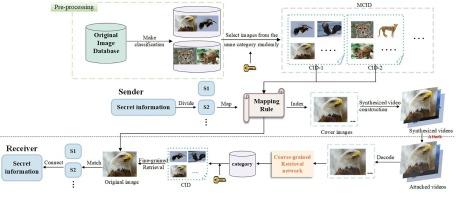A robust coverless image-synthesized video steganography based on asymmetric structure
IF 2.6
4区 计算机科学
Q2 COMPUTER SCIENCE, INFORMATION SYSTEMS
Journal of Visual Communication and Image Representation
Pub Date : 2024-10-01
DOI:10.1016/j.jvcir.2024.104303
引用次数: 0
Abstract
Due to the ability of hiding secret information without modifying image content, coverless image stegonagraphy has gained higher level of security and become a research hot spot. However, in existing methods, the issue of image order disruption during network transmission is overlooked. In this paper, the image-synthesized video carrier is proposed for the first time. The selected images which represent secret information are synthesized to a video in order, thus the image order will not be disrupted during transmission and the effective capacity is greatly increased. Additionally, an asymmetric structure is designed to improve the robustness, in which only the receiver utilizes a robust image retrieval algorithm to restore secret information. Specifically, certain images are randomly selected from a public image database to create multiple coverless image datasets (MCIDs), with each image in a CID mapped to hash sequence. Images are indexed based on secret segments and synthesized into videos. After that, the synthesized videos are sent to the receiver. The receiver decodes the video into frames, identifies the corresponding CID of each frame, retrieves original image, and restores the secret information with the same mapping rule. Experimental results indicate that the proposed method outperforms existing methods in terms of capacity, robustness, and security.

基于非对称结构的鲁棒无掩码图像合成视频隐写术
由于可以在不修改图像内容的情况下隐藏秘密信息,无掩盖图像加密技术获得了更高的安全性,成为研究热点。然而,在现有的方法中,忽略了网络传输过程中图像顺序被打乱的问题。本文首次提出了图像合成视频载体。选中的代表秘密信息的图像按顺序合成视频,因此在传输过程中图像顺序不会被打乱,有效容量大大提高。此外,为了提高鲁棒性,还设计了一种非对称结构,只有接收方利用鲁棒图像检索算法来恢复秘密信息。具体来说,从公共图像数据库中随机选择某些图像,创建多个无覆盖图像数据集(MCID),CID 中的每个图像都映射为哈希序列。根据秘密片段对图像进行索引并合成视频。然后,合成视频被发送到接收器。接收器将视频解码为帧,识别每帧对应的 CID,检索原始图像,并以相同的映射规则恢复秘密信息。实验结果表明,所提出的方法在容量、鲁棒性和安全性方面都优于现有方法。
本文章由计算机程序翻译,如有差异,请以英文原文为准。
求助全文
约1分钟内获得全文
求助全文
来源期刊

Journal of Visual Communication and Image Representation
工程技术-计算机:软件工程
CiteScore
5.40
自引率
11.50%
发文量
188
审稿时长
9.9 months
期刊介绍:
The Journal of Visual Communication and Image Representation publishes papers on state-of-the-art visual communication and image representation, with emphasis on novel technologies and theoretical work in this multidisciplinary area of pure and applied research. The field of visual communication and image representation is considered in its broadest sense and covers both digital and analog aspects as well as processing and communication in biological visual systems.
 求助内容:
求助内容: 应助结果提醒方式:
应助结果提醒方式:


